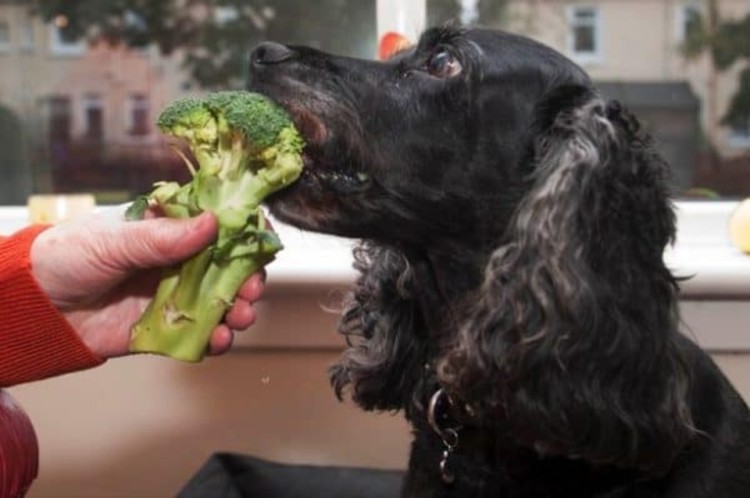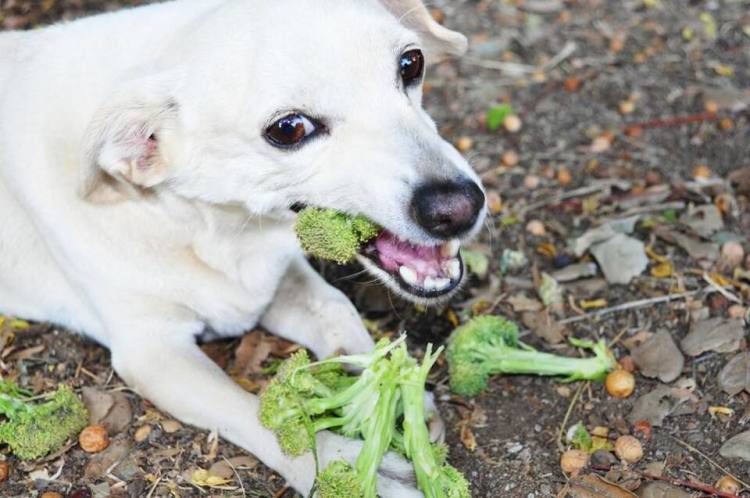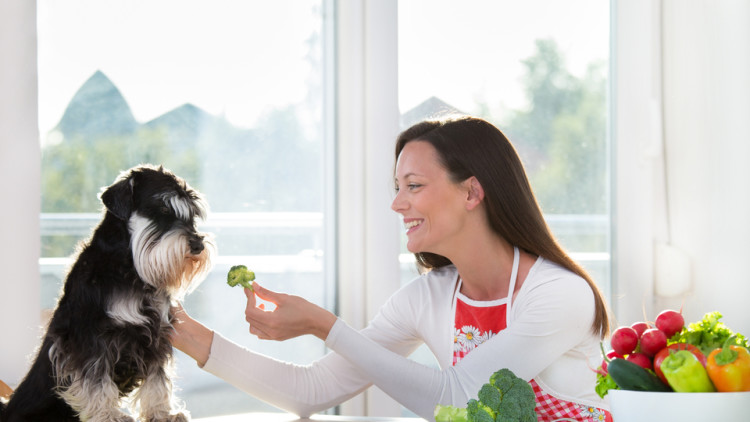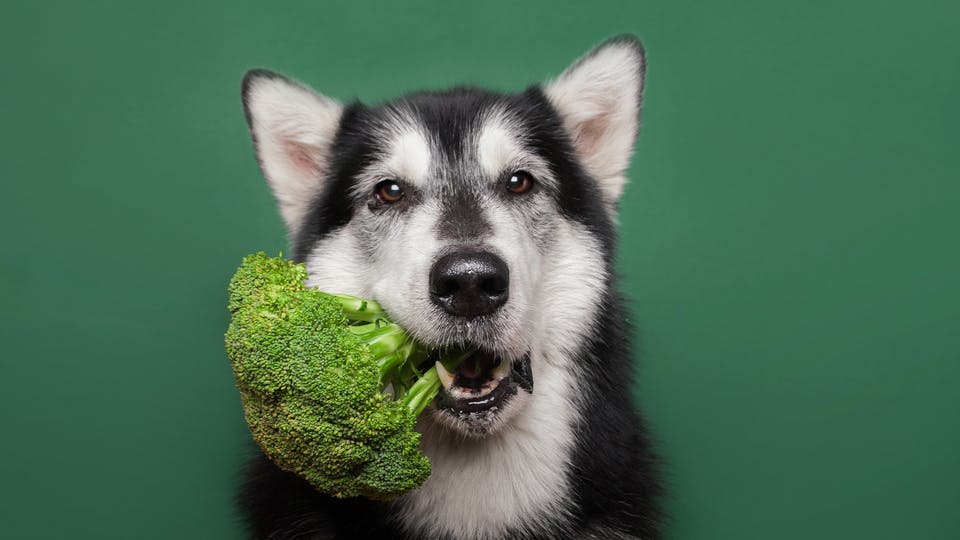You probably already know that broccoli is packed with vitamins, minerals, and fiber and that it is delicious almost any way you cook it. But before sharing your veggie tray with your pooch, you might wonder whether broccoli is safe for them.
The answer is yes - broccoli is a safe, nutritious, and tasty treat for your furry pal. However, there are several things you need to consider before serving this crunchy veggie to your dog.
Pro Tip: Dogs can be guilty of ingesting strange items and causing their owners lots of worries, as well as significant vet bills! Pet insurance is designed for unpredictable illnesses and accidents that could happen to your pup.
 (Image source: Our dog breeds)
(Image source: Our dog breeds)
Is Broccoli Good for Dogs?
Dogs are omnivores or, to be more precise, facultative carnivores. This means that their diet should be made up mostly of meat, but they can also consume plant protein.
And while dogs don’t require as much fruit protein as humans do in order to thrive, including certain plants in their diet in the form of treats or in prescription dog foods can have some health benefits. One of those plants is broccoli.
What Are the Health Benefits of Broccoli for Dogs?
The health benefits of this cruciferous vegetable are many and here are several reasons why it’s a great choice for an occasional treat for your pup:
Vitamin C Unlike people, pups produce vitamin C naturally and therefore, don’t have to consume it on a daily basis in order to stay healthy. However, as they age, the production of vitamin C in their body decreases.
Feeding your pooch broccoli now and then can help boost their immunity and keep them healthy. Other safe foods rich in vitamin C are strawberries, mangoes, and oranges.
Vitamin K Vitamin K is linked to the improvement of bone density. This is especially important for older pets who have begun to lose bone density and, as a result, have limited mobility. It is also great for younger pups who are very active and require strong bones.
Broccoli has the highest amount of vitamin K found in veggies, but there are also other foods that contain vitamin K and can safely be included in your dog’s diet, such as kale, cucumbers, and celery.
Dietary Fiber Broccoli is rich in soluble fiber which can help boost the dog’s digestive system and fight against high cholesterol. Feeding this green veggie in moderate amounts can help prevent cholesterol from building up around the arteries over time.
Potassium Potassium is a mineral that helps regulate a number of bodily functions crucial for your health, as well as that of your dog. One of those functions is the heart rate.
Low potassium levels can cause arrhythmia, a condition that can cause the heart to beat irregularly. Arrhythmia affects both humans and dogs, especially those with shorter snouts, such as Pugs, Bulldogs, Shih Tzus, and Boxers.
A serving of broccoli from time to time can help keep your pup's heart healthy. However, it should be noted that broccoli is by no means medical treatment for any heart-related condition. In case your dog suffers from arrhythmia, your vet will recommend the proper course of action.
Besides potassium, broccoli is also rich in other minerals such as sodium, chromium, and magnesium, that work together to boost your pet’s nervous and immune systems.
Sulforaphane This dark green vegetable contains high levels of sulforaphane, a compound that slows down the destruction of cartilage in joints. In this way, it acts as an anti-inflammatory, keeping those areas operating and functional.
Broccoli is also rich in omega-3 fatty acids, which can also help reduce inflammation levels. If your furry friend suffers from arthritis, adding some broccoli to their bowl could help keep their mobility as high as possible.
Finally, broccoli is also low in calories and low in fats, so serving it to your pooch won’t cause weight gain.
If you’re planning to include this crunchy vegetable into your pet’s diet, be sure to talk to your vet first.
 (Image source: Doggie designer)
(Image source: Doggie designer)
Is Raw Broccoli Safe for Dogs?
Dogs can eat both raw and cooked broccoli, without any oils, seasonings, or other added fats such as processed cheese. These add extra fat and calories your pooch doesn’t need and might upset their stomach.
If you decide to feed your dog with raw broccoli, be sure to cut it up into small pieces or chunks.
Cooking, roasting, or steaming the broccoli might be a better option than serving it to your pooch raw as it reduces the chance of intestinal blockages or choking. This is also the best way to add it to your pup’s bowl as an addition to their regular food.
You can also puree broccoli along with some dog-friendly fruits like watermelon, strawberries, blueberries, and bananas or other vegetables such as carrots, green beans, cooked sweet potatoes, or cauliflower. Yogurt or fresh fruit juice (no sugar) can also be added to this mix for a refreshing treat on hot summer days.
You can feed your pet frozen broccoli too, as long as you cut it up in advance.
What Are the Potential Hazards of Broccoli for Dogs?
While broccoli has many positive health benefits, there are some precautions you need to take into consideration before feeding it to your canine companion.
Harmful Bacteria If you serve broccoli to your pup raw, clean it thoroughly to eliminate any risk of lingering bacteria such as Salmonella. While it is true that cats and dogs are somewhat more resistant to Salmonella than humans, they’re not completely immune and can get very ill.
Symptoms of Salmonella infection in pups include:
- Fever
- Vomiting
- Loss of appetite
- Dehydration
- Lethargy
- Increased heart rate
If your furry pal exhibits any of the above-listed symptoms after consuming broccoli, be sure to get in touch with your vet immediately.
Allergic Reactions Allergies are another thing that you should keep an eye out for. Some of the most common symptoms include:
- Stomach issues like diarrhea and vomiting
- Breathing problems
- Scratching
- Excessive sneezing
- Dragging the bottom across the floor
If you notice your pup has any of these symptoms, make sure to stop feeding them broccoli and them to the vet right away.
Choking Hazard While broccoli stalks are edible, they’re very fibrous and can pose a choking risk if given in large chunks. That’s why it is always better to serve them cooked or at least cut them up into bite-sized chunks. You should also stay close while they’re eating to make sure there isn’t any distress.
Gas All cruciferous veggies are known for causing gas, so broccoli might make your dog a bit gassy, which is quite normal and nothing to worry about. However, excessive gas can be a signal that your pet has a digestive issue.
So if you are serving broccoli to your furry friend for the first time and the resulting smell becomes unbearable, make sure to speak to your vet.
Portion Control The broccoli florets contain isothiocyanate, a potentially harmful ingredient that is present in all cruciferous veggies such as kale, cabbage, and cauliflower and can cause gastric irritation in some animals.
That’s why proper portion control is very important. Too much isothiocyanate can result in gas, bloating, nausea, and diarrhea. In case your pup consumes a large amount of broccoli, these issues can become quite severe and result in serious health problems or even death.
So, how much is enough? For dogs, broccoli should make up no more than 10% of their daily intake. In general, anything over 25% is considered toxic. It should be noted though that this ‘10 percent rule’ largely depends on the pup’s size and age. For instance, the nutritional needs of young puppies are different than those of mature pets. They need a developmental diet specific to their growing bodies, so it might be a good idea to hold off offering broccoli until they’re more mature.
Moreover, every animal is different and some pups may have a stronger reaction to broccoli than others. So, whenever you’re feeding your dog a new food, it’s important to monitor them to see how they react to it.
For many gastrointestinal diseases, therapeutic or prescription diets are needed to help control the symptoms, so make sure to get pet insurance that covers the costs of these diets. Gastrointestinal surgery can also be very expensive, so having a pet insurance policy can come in handy when faced with expenses of this kind.

Final Thoughts
So, can dogs eat broccoli? Yes, but only in moderate amounts. This crunchy veggie is nutritious and safe for dogs, but it should be considered a snack rather than a full meal. Offer it to your pooch alongside a well-balanced dog food formulated for their specific nutritional needs. Talk to your vet about how much broccoli is safe or if broccoli is the right treat for your pup’s health.
